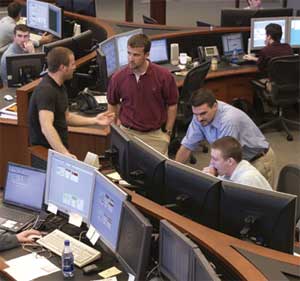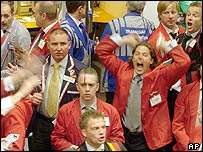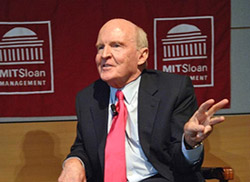Jonathan Wall, Marketing Director at the top online electronics store in the UK dabs.com, explained at Internet World 2006 that his marketing team is now composed principally of web analytics experts who are constantly trading on the screens for the best prices and return on investment for their advertising spending.With revenues in excess of €300m and an online marketing budget rumoured to in excess of €25m, can the dabs.com web analytics team be the future model of marketing teams?
|
Jonathan’s vision could not be more different from the traditional marketing department, with its one-stop-shopping of TV upfront and the big-media lunch circuit. Compared to the accountability forced onto internet marketing, the TV advertising industry is wasteful, untargeted, irrelevant, and ultimately damned irritating to your customers. |

|
The change has similarities with the modernisation of financial market trading. Traditional buying and selling of financial assets was based on open outcry system. The prices at which customers were able to sell their assets depended on a chain of human interaction which ended in the open outcry buying and selling trading pit.

|
The open outcry system was plagued by inefficiencies, trader cartels which pre-arranged price and articificially increased price spreads and margins for the traders and banks. As a result the price spread, difference between the buy and sell price for the clients and suppliers was large. Talented traders could read their fellow traders and manipulate larger spreads for themselves. |
|
Most of these human intermediaries have been taken out of modern financial trading. Open outcry trading has become mostly extinct, replaced by electronic trading. The buy sell spreads, and the cost of trading have dropped dramatically. The inefficiencies and huge cost of face to face trading has been replaced by zero overhead direct screen trading. The client has real-time access to real prices and can trades directly with suppliers. |

|
Google Adwords bidding is a copy of financial screen trading. Though the spread, the margin retained by Google is still a large inefficiency, that will come down as other online advertising networks, like Yahoo Search Marketing start to compete on more level basis.
The world of advertising is heading towards a big change. Gone are the days of inefficiency and un-accountable media channels. The new trading in advertising buy is electronic and transparent, and completely accountable.




